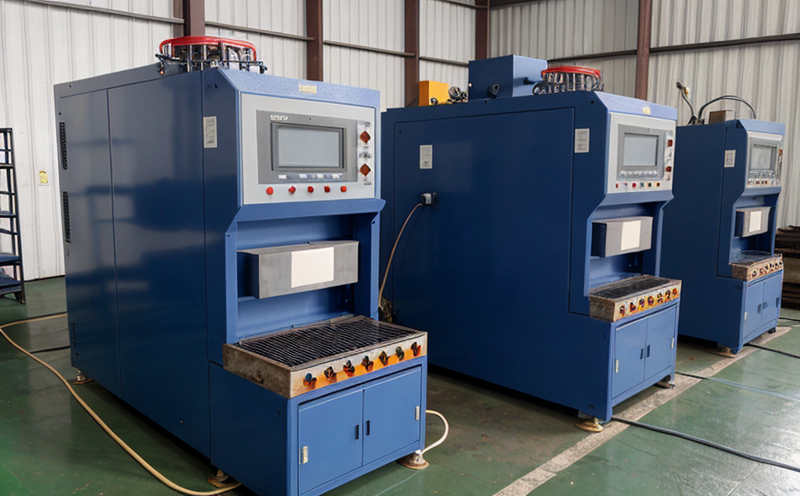DIN 51732 Petroleum Products Viscosity Testing
The DIN 51732 standard is an essential tool used to measure the viscosity of petroleum products, ensuring that these fluids meet specified performance criteria. This test method is widely recognized in Europe and beyond for its accuracy and consistency. Understanding the principles behind this testing helps quality managers, compliance officers, R&D engineers, and procurement professionals ensure they are meeting the strictest standards.
Viscosity plays a critical role in the performance of petroleum products such as lubricants, hydraulic fluids, and fuels. It refers to the internal friction or resistance to flow within a fluid. The DIN 51732 test measures viscosity under specific temperature conditions, typically at 40°C, which is crucial for ensuring that the product behaves correctly in real-world applications.
The testing process begins with precise preparation of the sample. This includes ensuring the sample is representative and free from contaminants. The specimen must be stored according to specified temperatures to ensure accurate results. Once prepared, the sample is introduced into a viscometer designed for this standard. The viscometer measures the time it takes for a specific amount of fluid to flow through a calibrated capillary under controlled conditions.
The DIN 51732 test method uses different types of viscometers depending on the viscosity range of the petroleum product being tested. For low-viscosity fluids, capillary viscometers are used, while for higher viscosities, rotational viscometers may be employed. The choice of equipment and conditions ensures that the results are accurate and repeatable.
Understanding the DIN 51732 standard is not just about compliance; it also helps in optimizing production processes. By ensuring viscosity is within specified limits, manufacturers can reduce wear on machinery, enhance product performance, and extend service life. This testing is particularly important for industries like automotive manufacturing, aerospace, and petrochemicals where fluid behavior directly impacts safety and efficiency.
Compliance with DIN 51732 is essential for several reasons. It ensures that the product meets international standards, which is critical for export markets. In addition, it helps in maintaining a consistent quality level across batches, reducing variability and potential defects. For R&D engineers, this test provides valuable data to refine formulations and improve product performance.
Procurement professionals can use DIN 51732 results to verify that the suppliers meet the required specifications. This ensures that the products received are of high quality and consistent with the expected standards. The standard also aids in troubleshooting issues by providing clear, measurable data on viscosity fluctuations.
Applied Standards
The DIN 51732 standard is one of several international standards used to measure petroleum product viscosity. It is part of a broader framework that includes ISO and ASTM standards, which are also widely recognized in the industry. The DIN 51732 test method is particularly important for European manufacturers and suppliers who must comply with local regulations.
The standard specifies detailed procedures for testing, including the type of viscometer to use, the temperature control requirements, and the calculation of viscosity. This ensures that all tests are conducted under consistent conditions, leading to more reliable results. The use of precise equipment and controlled environments is crucial in achieving accurate measurements.
- Viscosity Measurement: DIN 51732 focuses on measuring viscosity at 40°C, which is a standard temperature used across the industry for consistency.
- Type of Equipment: The use of capillary viscometers and rotational viscometers as specified by the standard ensures accuracy in different viscosity ranges.
The standard also includes guidelines on how to handle and prepare the samples, ensuring that they are representative and free from contamination. This preparation is critical for obtaining accurate results that reflect the true properties of the petroleum product.
Benefits
- Quality Assurance: Ensures that petroleum products meet stringent quality standards, enhancing reliability and performance.
- Compliance: Meeting DIN 51732 requirements is essential for export to European markets and compliance with international regulations.
- Precise Measurement: The standard provides precise measurement techniques that are critical for optimizing production processes and ensuring product consistency.
- Troubleshooting: By providing clear data, this test helps identify and address issues in the manufacturing process, leading to improved quality control.
The DIN 51732 standard is not just about compliance; it also offers significant benefits for businesses operating within the industrial manufacturing sector. By ensuring that viscosity is accurately measured, companies can reduce costs associated with product failure and improve overall efficiency. This leads to better customer satisfaction and a stronger market presence.
For R&D engineers, this test provides valuable data that can be used to optimize formulations and enhance product performance. The precise measurements obtained through DIN 51732 help in identifying the optimal viscosity range for different applications, which is crucial for industries like automotive manufacturing and petrochemicals.
International Acceptance and Recognition
DIN 51732 has gained widespread acceptance and recognition across various sectors due to its precision and consistency. The standard is widely used in Europe but also finds application in other parts of the world where petroleum products are manufactured or imported.
- European Compliance: DIN 51732 is a key requirement for manufacturers operating within the European Union, ensuring compliance with local regulations and standards.
- Global Market Access: Meeting these standards opens up opportunities to export products to countries that recognize this standard, enhancing market access.
- Industry-wide Acceptance: The broad acceptance of DIN 51732 within the industry ensures that results are universally understood and comparable across different laboratories and manufacturers.
The use of DIN 51732 in international markets is particularly important for companies looking to expand their global footprint. By ensuring that products meet these stringent standards, businesses can gain a competitive edge in the market. This standard also fosters collaboration among industry players, leading to shared best practices and innovations.
For quality managers and compliance officers, understanding the scope of DIN 51732 is crucial for ensuring that their operations are aligned with international standards. This not only enhances the reputation of the company but also ensures that they can meet the expectations of customers worldwide.





